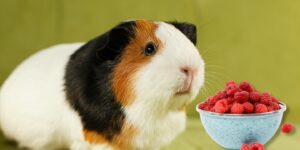Yes, guinea pigs can eat cantaloupe. This type of fruit is a great source of vitamins and nutrients for guinea pigs, and it can be a tasty and refreshing treat for them. However, it's important to feed cantaloupe to your guinea pig in moderation, as too much of this fruit can cause digestive issues. Maintaining a balanced diet for your guinea pig is crucial for their overall health and wellbeing.
Benefits of Cantaloupe for Guinea Pigs
Cantaloupe is packed with vitamins and nutrients that can benefit your guinea pig's health. It is a good source of vitamin C, which is essential for guinea pigs, as they are unable to produce this vitamin on their own. Vitamin C is important for a guinea pig's overall health, as it helps promote a healthy immune system and prevents scurvy.
In addition to vitamin C, cantaloupe is also a good source of other vitamins and minerals, including:
Vitamin A
Vitamin A is important for guinea pigs as it helps maintain healthy eyesight, bone growth, and cellular function.
Vitamin B6
Vitamin B6 plays a vital role in the proper functioning of the nervous and immune systems and helps regulate hormonal balance.
Vitamin K
Vitamin K is important for blood clotting and maintaining healthy bones.
Potassium
Potassium supports proper kidney function, nerve signaling, and muscle contractions.
Magnesium
Magnesium is essential for maintaining proper bone health, neurological function, and metabolic processes.
Fiber
Fiber helps promote healthy digestion and bowel function in guinea pigs.
These nutrients can help to support your guinea pig's overall health and well-being.
Feeding Cantaloupe to Guinea Pigs
When feeding cantaloupe to your guinea pig, it's important to do so in moderation. While this fruit is a great source of vitamins and nutrients, too much of it can cause digestive issues, such as bloating, diarrhea, and gas.
To avoid these problems, it's best to only feed your guinea pig a small amount of cantaloupe at a time. A good rule of thumb is to limit the amount of cantaloupe to no more than a tablespoon per guinea pig per day.
You can offer this amount as a treat, along with your guinea pig's regular diet of hay, fresh vegetables, and a small amount of fortified guinea pig pellet.
It's also important to make sure that the cantaloupe you feed your guinea pig is fresh and ripe. Unripe cantaloupe can be difficult for your guinea pig to digest and can cause digestive problems. To check if a cantaloupe is ripe, press the stem end with your thumb. If it gives slightly, it's ripe and ready to be eaten.
Potential Risks and Side Effects
Feeding your guinea pig an excessive amount of cantaloupe can lead to digestive issues. These can include:
Bloating
Due to the high water content in cantaloupe, overeating may cause your guinea pig to become bloated and uncomfortable.
Diarrhea
Too much cantaloupe can upset your guinea pig's digestive system, resulting in diarrhea.
Gas
Excessive consumption may cause gas and discomfort in your guinea pig's digestive system.
Aside from these digestive issues, unripe cantaloupe can be dangerous for your guinea pig due to its difficulty in digestion. Allergic reactions to cantaloupe are rare but may occur.
Conclusion
In conclusion, guinea pigs can safely eat cantaloupe. This fruit is a great source of vitamins and nutrients that can benefit your guinea pig's health. However, it's important to feed cantaloupe to your guinea pig in moderation, as too much of this fruit can cause digestive problems. Make sure to provide a balanced diet for your guinea pig, including hay, fresh vegetables, and fortified guinea pig pellets. Don't be afraid to explore other fruits and vegetables to ensure that your guinea pig receives a variety of nutrients and maintains a robust diet.


























